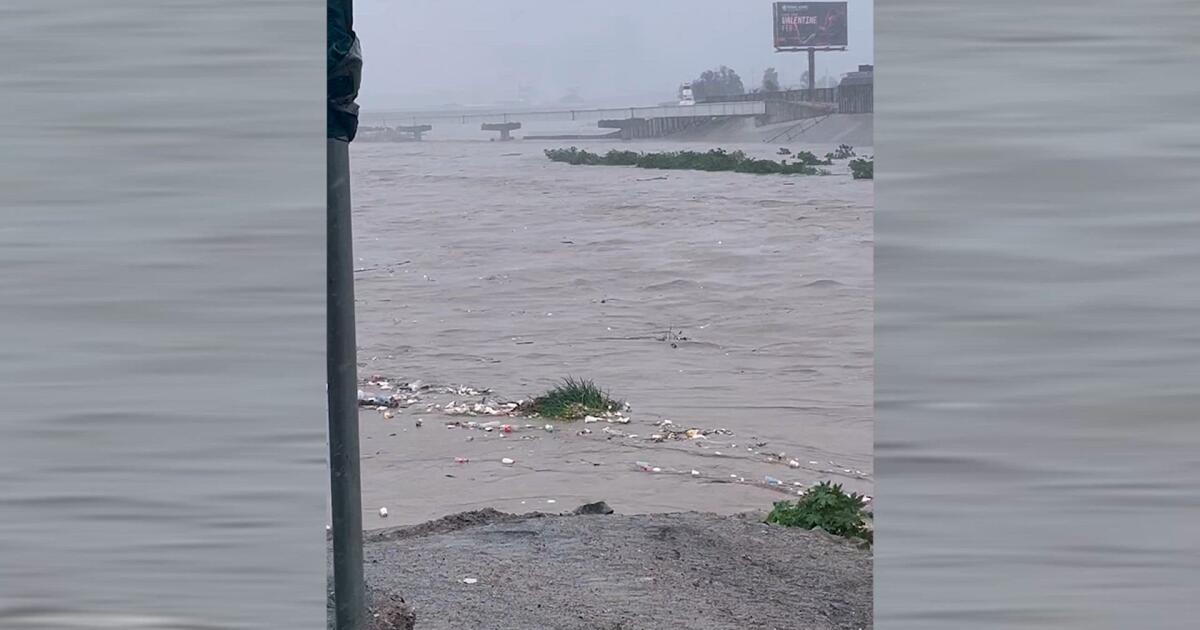
Gov. Gavin Newsom and other elected officials are ramping up the pressure to get Congress to approve $310 million in emergency spending to fix the crossborder sewage crisis that is expected to worsen with another major storm headed for the region Thursday.
On Monday, Newsom penned a letter to Senate and House leaders urging them to approve President Joe Biden’s October request to include the funding in a supplemental appropriations bill.
The money would go toward fixing and expanding the failing and outdated wastewater treatment plant at the U.S.-Mexico border that repeatedly overflows with Tijuana sewage.
“Southern California communities have suffered from this crisis for far too long, impacting the lives and livelihoods of tens of thousands of people and U.S. Navy Seal special operation forces who train in those waters,” Newsom said in his letter. “Congress must act quickly to approve the President’s proposal and provide this much needed, urgent funding.”
The plea to Congress to greenlight the $310 million also comes in the form of a state resolution. Last week, California lawmakers introduced a resolution that urges release of the money, as well as pleads for Biden to declare the sewage crisis an emergency.
Assembly Joint Resolution 12, sponsored by several legislators including San Diego’s Assemblymember David Alvarez and Sen. Steve Padilla, comes at the request of Imperial Beach Mayor Paloma Aguirre, who said the Legislature should declare the crisis an emergency, even just symbolically, because the Newsom administration has repeatedly made the case that the issue is a federal one.
The resolution, however, only calls on Biden, not Newsom or the Legislature, to proclaim a state of emergency to expedite solutions. Newsom’s administration said Tuesday via email that the governor is focused on advocating for federal money to address the federal facility. And that the state has already invested more than $32 million in projects to mitigate border pollution.
“It is the federal government’s responsibility to complete the capital improvements to the facility that are required to stop the ongoing harmful discharges into the marine environment that are impacting public health, the local economy, and ecosystems and species in coastal communities,” Newsom said in his letter to Congress.
Pollution has worsened over the years because of an inoperable wastewater plant in Baja California, a pipeline rupture, severe rainstorms and deferred maintenance to the South Bay Wastewater Treatment Plant. The latter is a federal facility managed by the International Boundary and Water Commission on federally owned land in San Ysidro. The plan has been to double the capacity of wastewater it treats from Tijuana using $300 million that was previously secured. But those funds are now expected to fall short because the plant is in a state of disrepair.
Earlier this month, Mexico broke ground on a long-awaited replacement for its crumbling wastewater treatment plant that officials said will dramatically reduce the discharge of sewage that repeatedly reaches South County shorelines.
To increase the pressure on federal officials, several San Diego residents and officials, including Aguirre and Chula Vista Mayor John McCann, flew to Washington, D.C., Monday to advocate for the $310 million for the South Bay plant.

San Diego elected officials and residents visit Washington, D.C. to advocate for emergency funding to fix the sewage crisis. They are outside the White House on Tuesday.
(Courtesy of Laura Wilkinson Sinton)
“We need to fix that plant and we need to double its capacity,” said Aguirre in a video from D.C. that she posted on her social media Monday. “But right now everything is riding on Congress. So, we want to make sure that we spend our days, the next 48 hours, advocating for that funding to be approved.”
The calls come as another major storm is expected to bear down on the region and potentially worsen the situation. Last week’s devastating storm brought more than 14 billion gallons of sewage-tainted waters to San Diego, according to the International Boundary and Water Commission.
“This storm brought the highest peak flow in the Tijuana River since 1993 and the (fourth) highest peak flow since the IBWC began operating the river gage in 1962,” said Morgan Rogers, are operations manager for the IBWC.






